Elyzabeth Gregory Wilder: Welcome to Teaching Theatre, a podcast about the practice and pedagogy of theatre education produced for HowlRound Theatre Commons, a free and open platform for theatremakers worldwide. I’m your host, playwright and theatre professor Elizabeth Gregory Wilder.
Welcome back to the Teaching Theatre podcast. We’re really excited today to be talking about devising. We have two exciting guests with us today. We have Andy Paris, who’s an Emmy-nominated writer who teaches devising at North Carolina School of the Arts. He’s a founding member of the Tectonic Theatre Project and helped develop Moment Work, a technique for theatrical exploration and interdisciplinary collaboration. Using the Moment Work technique, he co-created the critically acclaimed play The Laramie Project.
And we have Emily Harrison, an assistant professor of theatre at Hamilton College. She’s the founder and producing artistic director of the Boulder-based award-winning Square Product Theatre. Emily’s work focuses primarily on the creation and development of new and innovative works with American theatre and an exploration of American mythology, violence, and disaster and performance. Emily holds an MFA in performance from Savannah College of Art and Design, and a PhD in Theatre and Performance studies from the University of Colorado Boulder. Thank you, guys, for being with us today.
Andy. Paris: Thank you for having me.
Emily Harrison: Thank you for having us.
Elyzabeth: Before we get started, let’s make sure everyone knows what we mean by devising. Andy, could you talk a little bit about what devising is and where it came from?
Andy: Thanks, Elizabeth. I was hoping that you would ask Emily this question first.
Elyzabeth: Surprise.
Andy: My dean kind of makes fun of me. He’s like, “Who asked you ‘What is devising?’ today on campus?” Basically, I feel like I’ve spent the last five years here trying to explain what devising is, and it’s interesting because what I’ve found too is that training people in devising practice and devising a piece of theatre feel like two very different endeavors to me. And so when we’re talking about education, I can talk about what devising means to students first, and then if you want, we can also talk about what it means to devise a work.
But that’s sort of how I’ve been able to try to parse it in my brain so that I’m not trying to do two things at once that seem sometimes contradictory, because devising a piece of work involves a product. And part of what devising’s gift, I think, to students is the gift of concentrating on process without an immediate product in mind. And so in training devising practice—I’m not really answering the question “what is devising?” but I’m trying—that in devising practice, at least the way that I understand it, we are examining and the tools of the theatre and the power of the tools of the theatre and how the theatre operates and how theatrical tools can be used to create form and how that form coupled with content as form and content sort of relate to each other into moments of theatrical narrative.
So when we develop Moment Work, the moment we’re defining in part as a, a unit of theatrical time. So that has a beginning, a middle, an end, and some kind of dynamic change. And that dynamic change is a thing that makes it a piece of narrative. So in devising practice, we’re not starting with the story, we’re starting with elements and form and then noticing what story elements are coming out or what narrative elements emerge from that.
Now, eventually then, and this gets into the making a piece thing, you have to go write the thing that you found. So it’s not like a magic pill where it just rises up from the floor and you have a play. But what you are hopefully endeavoring to do is to dig in and find form that you as your personal artistry relate to or excites you or resonates with you, and then carry that forward with you to work more deeply in that form.
In my day when I was coming up, I think it was called “experimental theatre,” and I went to the Experimental Theatre Wing at New York University, and it was very much in the vein of devising, just people weren’t using that word. And I think what happened was “experimental theatre” had began to adopt the kind of... Well, a kind of product of theatre. And so in order to separate a... I think people started to use devising to try to separate themselves from experimental theatre, which had this whole onus of what that was. And now I think that we’re somewhat gravitating toward the same place that people think of devising or devised theatre as a certain kind of theatre, whereas in devising, you might end up with something that looks very much like a play. It’s just how you arrived there is a very different journey.
Emily: Yeah, I think that’s great. I would just say that devising really, the most simple definition I can think of is that it is making an original piece of theatrical material together as an ensemble, as a collaborative. And like Andy was saying, it could be something that ends up being very abstract in nature and more experimental. I think “experimental” has become a bad word in theatre community. When you say making experimental theatre, most people are like, “Oh, God,” which is too bad because I don’t think they actually know what it means. But I also think that some people have seen some really bad “experimental theatre.”
So I think the simplest definition is that it’s making something new with a group of people, not necessarily privileging verbal language the way that most Western theatre does. And it can be more abstract, and it can end up being a product that looks very much like a traditional linear play.
Part of what devising’s gift, I think, to students is the gift of concentrating on process without an immediate product in mind.
Elyzabeth: Excellent. So now that we have our definition, how do you guys introduce devising to students? Where do you start?
Emily: Oh, man. I mean, I start small. I’m teaching in a college, and I’m teaching students who are very intelligent and very eager. They want to learn how to do things, and they want to learn about different kinds of ways in... But they’re still, the experience of theatre is very much traditional. So I start small and I start with having conversations with them about “what are the tools that we have at our disposal in theatre?” I ask them to consider pieces of theatre that they’ve seen and to think about a moment that really, really stood out to them and a piece of theatre that they’ve seen, and to talk about that and to break it down.
And normally what you find when you do that is that they’re not talking about plot. A lot of times they’re not even really talking about story. They’re talking about how all the elements came together to make them feel something. And so we start there. I don’t have a specific methodology. I use all kinds of different ways in and different texts, and sometimes I show them some video clips, but I also don’t want them to get an idea in their head of this is what devised theatre looks like because it really can be such a broad range of experiences.
So we just start at the very beginning. What can you do with a light? What can you do with a flashlight? What can you do with this jacket? What can you do, a doorbell? Just different tools that we have at our disposal that we can use to do something theatrical that’s not necessarily about the words.
Elyzabeth: It’s a very organic process and you sort of follow their lead?
Emily: Depends on who’s in the room. When I’m teaching a devising class, the goal is at the end of the semester, I start having them make like really small, just like micro projects basically that are two or three minutes in small groups. And then the goal is at the end of the semester, we all make something together. They decide on some sort of thing. They’re interested in exploring some sort of topic or theme or whatever, and they have to decide together that that’s the thing they want to do. And then I give them little assignments and we work on it throughout the second half of the semester and then show something that’s usually twenty-ish minutes long.
Elyzabeth: Cool. So you try to make it very attainable for them?
Emily: Yeah, because they’ve never done it before, and they have all these other things they’re doing. I mean, you’re both educators, so they’re in all these classes ,and then they’re also in all these different... They’re in acapella, and they’re in the improv troupe, and they’re in choir, and they’re in debate, and they’re just doing all this other stuff. And so I want to make it something that’s like they have to work to do it, but that it is something that we can do. It’s not beyond the realm of reality for them.
Elyzabeth: What about you, Andy? Where do you guys start?
Andy: I think in similar places as Emily. So I usually use two strains of pedagogies when I teach devising to people who haven’t done it before. Now, I will say that we’ve worked some devising practice, so I teach third year conservatory students, so they’ve already had two years of more traditional training. However, there’s a movement teacher named Jason Bohan who has them for two years before me, and he’s a Leqoc person and has done a lot of devising. And so he kind of starts to work some devising practices into his movement classes. He doesn’t necessarily always call it that.
So when I first got here, I had to start from beginning, beginning and take it a lot slower. I’ve been able to ratchet things up a little faster in years. So it does help to have those basics of physical impulse movement and ability to move on impulse and kind of act on impulse beforehand. But basically what I do is I use what I’ve been using all my career because I didn’t know what else to teach except for how I was a practitioner.
I start with the Six Viewpoints the way Mary Overlie taught it, because that’s who taught me. And so I start with Overlie’s viewpoints. I even start them reading the first chapter of her book on space. But I quickly couple that with the beginnings of Moment Work, which is of course methodology that I co-created with Moises Kaufman and the rest of Tectonic Theatre Project. And in that way, we’re kind of working... Sometimes Moment Work can feel a little bit more intellectual. And so working together that grounds it in something that is a little less cerebral and more instinctual and impulsive.
So I use those two pedagogies in tandem to... And what Moment Work does is much in the same vein as what Emily was talking about, is it really breaks down what we call the elements of the stage. Each tool is a repetition, rhythm, lights, set sound, and then the list goes on. And we make that list much like Emily does. I ask them what moments they’ve seen that really strike them that were very powerful and impacted them a great deal.
I have the same experience where the responses are 95 percent not text-related, if that’s a way to put that. So almost never does anyone talk about text. They talk about a gesture or a lighting gesture or way someone moved or the way someone changed something that they didn’t expect. And so we break that down to get beyond the like, “It was amazing.” Someone always says, “’Defying Gravity,’ and it was amazing.” And then we start to say, “Okay. Well, what was amazing about it?”
So rather than only being a consumer of our, how can we act as a practitioner and critique in a way that is helpful to us in creating our own work and also in analyzing the work in front of us? And so we break that moment down to scale, and costume, and light, and rhythm, and pitch. And so all the things that went into “Defying Gravity” to try to make a list of those tools that we can then spend the rest of semester becoming facile and becoming familiar with and finding all the uses of those things and how they can be used narratively.
So I use those two lanes of pedagogy to work them out of the space of just interpreting a script and just interpreting text into finding what excites them and finding what artistry is within them through listening to the elements of the stage and what they gravitate toward and what interests them. And then we start introducing something along the lines of text later on in the semester so that they get a sense of what it means to write words and how that’s different than writing other moments. And then we start working with a hunch, which is Peter Brooks word, but also a word that we used a lot in Tectonic, just this sort of “what is tickling your brain artistically” and start to articulate that and articulate a path of research to dive into those questions that make up that hunch.
So my class is a yearlong class. So by the end of the second semester, they’re starting to work on their own projects, and we work on those throughout the second semester. We work in cohorts. And like Emily said, their bandwidth is what it is. They’re doing a lot of other things. They’re in shows. They’ve got other classes and all extracurricular activities that go on that are also valuable. And devising, I think it’s important to note that I think the nature of devising is that it takes time.
It takes a lot of time. There’s really no substitute for that. You can’t really speed up the process. So we try to work on smaller chunks and also not... I think that’s the advantage of, in a way, the time limitation gives us an opportunity to not worry about product because I just start by saying, “You can’t possibly end up with a kind of play at the end of this. It’s just not humanly possible.” So let’s just let go of the idea of what this is going to be and work moment to moment and see what comes up. And I think that’s very freeing for them, hopefully. And so that’s how we move through the year.
Teaching students to generate their own material and to use those same tools to approach material that already exists in a creative innovative way to sort of reimagine what those plays can look like is going to be crucial to the survival of our field.
Elyzabeth: So devising has become a bigger focus in theatre training programs in the past ten years or so. Why do you think that is? What do you think the appeal is?
Andy: The way the industry is changing right now, creating one’s own content is becoming more and more important. And this devising practice gives students a way in so that when they have an idea, they have a practical way of starting to explore that idea. A lot of times what I hear all the time is, “I have this great idea, but I don’t know where to start.” And if after they’ve taken my class, they’re still saying that I have failed. That is the test for me. It’s like if an alum comes back and I’m like, “Okay, I failed that alum because they did not know how to start their project.”
And that’s just tongue in cheek. I think really that is what I am trying to offer them is a way in to making their own content. And I think the other thing about the industry right now is we are in an inflection point, a very important inflection point where institutional theatres are closing, but in droves. And a lot of people agree with the statement that the reason a lot of these institutions are closing is because they lost touch with their community that they’re serving.
I think that in some ways this work lends itself to getting out. It lends itself to site-specific work. It lends itself to including different kinds of performance practice. It questions the role of the audience. And we spend a lot of time using the audience as an element of the stage asking where are they? How are you relating to them? If you want them to participate, how do you do that? And asking about that relationship. And that’s a really important piece of communicating pieces of theatre that I think might’ve fallen off some people’s radar.
So for instance, this semester, I’m directing a musical. I’m not devising it, but it was a musical that was originally commissioned by the Public Works program at the Public Theatre. And we are trying to mirror that process where I’m engaging members of the community, and we’re going out into the community and giving workshops and then inviting them to come and be a part of the show.
So there’s this exchange, and then they’re going to bring in people, and now we’re going to have an actual community conversation about what the play is trying to communicate. I think that devising sort of lends itself to things like that, that connect us more deeply and more directly with the community in which we’re serving or can and has the possibility to do that.
Elyzabeth: Emily, do you have anything to add?
Emily: I mean, I would just echo what Andy said. I mean, I think the sort of traditional subscriber model for theatres is not a useful model for most of what’s happening at this point. I feel like so many theatres have been playing it safe, and they’re sort of reaping the consequences of that. And I also think that that’s not to say we shouldn’t be producing plays that exist. We should be producing plays that exist, but there’s this... I mean, I think studying devising and learning different approaches also offers something to staging those plays, to staging important historical texts. There are all these different ways in when you learn these devising tools that can make productions of those plays far more compelling if you’re not just doing the same thing over and over and over again.
I think this sort of teaching students to generate their own material and to use those same tools to approach material that already exists in a creative innovative way to sort of reimagine what those plays can look like is going to be crucial to the survival of our field. I mean, I will say I don’t think that theatre is going to... People have been predicting the death of theatre since all of time. So I don’t think that’s going to happen, but I do think at least in the American theatre, we are at a pretty crucial point where it’s like, what direction are we going to go in? How are we going to continue doing this? Who’s going to support it?
And if you don’t have the buy-in of your community, I mean, we are not a country that really supports the arts on a national level at the scale that many other countries do. So you really do have to rely on your community, and if you’re not engaging with them, they’re not going to support the work. And that’s just a no-brainer.
Elyzabeth: So we’ve talked about devising as this very collaborative process. Do you think it’s important to have a director involved in the devising process, someone who guides that vision, or should it be entirely collaborative?
Emily: I think it could go either way. I think it’s good to have at least one or two people in the room who have some eye on the whole picture. But I think of a director as being part of the collaborative team. So I don’t typically work... I mean, I have a few times, but I don’t typically work in spaces where we’re making something new where there’s not necessarily someone serving as a director, or at least the people are moving in and out to have a look at a stage picture and have a sense of like, “Oh, actually maybe we need to shift this over here or there’s an opportunity for lighting here.” I think it just depends on the group. I think it could go either way. I personally like having a director in the space, even if they’re not also performing in the piece.
Elyzabeth: What about you, Andy?
Andy: Similarly, I have not been really in a devising space where there wasn’t a director or a writer who had their eye on the whole thing. I mean, I tend to think about it in terms of one can do this practice however one devises do it. That’s part of what devising is. I think one of the very important aspects of devising is feedback. It’s very difficult to see what you’re doing while you’re doing it. So whether that’s one director or another, I think it’s valuable to have somebody in the room. People do it with video and mirror, things like that.
I’m not at all saying it’s impossible, but I do find it helpful to... And oftentimes it’s someone’s hunch. I think it’s up to the individuals and the company they’re working with and their collaborators.
Elyzabeth: And because this is such a collaborative process, how do you address conflicts when they arise, especially when someone feels like they aren’t being heard or their ideas aren’t being included?
Emily: Fistfights, I think.
Elyzabeth: You just duke it out?
Emily: No, I mean, I think you learn.
So I’m really good friends with the folks in a theatre company called Buntport Theater in Denver, and they only make new work together, five of them now, and they only make new work together. And they’ve been doing it for more than twenty years. They’ve made more than fifty original works together. And this is a question they’ve been asked a lot, “What do you guys do when you get upset with each other? How do you work through that?” And Aaron Rollman was just like, “We’ve had every fight we can possibly have. We’ve just learned how to disagree with each other. And we know at some point we can say, ‘Oh, we had this fight on the other show five years ago. How did that resolve? How did we get to our solution? Can we just skip to the resolution?’”
I think when you are working in this kind of work, you often find yourself in the room with the same people repeatedly. Most of us are also working with new people as well. So it is often about learning people’s communication styles, saying from the beginning, from the beginning, like day one, if anyone is ever upset about anything, or the second you’re starting to feel something that’s not a good feeling, let’s have a conversation about it so that it doesn’t become something larger.
Because I personally, when I’m in a space working with other people, I don’t like conflict. I don’t want to be upset with people. Inevitably, you’re going to have moments where you disagree about something that you’re doing, some moment that you’re making or some element that you’re playing with. And for me, it’s just sort of like, “Let’s talk about it. Let’s talk it through and see if we can come to some sort of resolution and see how many different ways can we try this until we get to what we think is going to be the...” Whatever is going to serve the whole. It’s hard. You have to let your ego go at points and just be like, “Oh, I had this idea that I really like, but everyone else is saying it doesn’t work, so I just have to let it go.” You just have to kill your darling sometimes.
I will not pretend to be the person who’s the best at it because it can be really hard when you’re in conflict with someone else, but for me, it really is about... I’ve learned to not avoid those conversations, to really just sit down and be like, “Okay, we need to chat about this. I want to work through this and make sure that we are all on the same page and can do something together that we all feel good about.”
As long as we’re talking about a process and not a product, I would say devising becomes essential and that it provides different pathways through the industry, which is splintering.
Elyzabeth: What about you, Andy? How do you handle that when you are working on things, but also in the classroom?
Andy: It is important to, I think, just start by recognizing that these conflicts and tensions that arise can be very inspirational and fruitful to the process because inherently there’s tension in the work. And if you can keep the conversation work-related and try to stay away from “my idea,” “your idea” and critique what is happening, then I think it’s a little... It could be more constructive to march through those problems that come up. And they will. I think in any really crackly, fruitful process, conflicts will arise. And again, I think that those can be advantageous.
I, in the classroom and also in practice, I lean a lot on... And in class I teach the Critical Response Process that Liz Lerman developed as part of her dance company. And there’s actually a book, a pamphlet that you can buy of hers that takes you through what that process is. And it’s a four-step process. I find it very useful. And there are a couple ways that it’s useful. One is that it empowers the artist in the critique process so that when they’re offering an idea, there’s some language around how that idea gets critiqued. And there’s also a process by which the artist has, or the presenter/performer has some sort of control over how that process goes so that they can ask certain critique questions and ask specifically what they’re interested in hearing about and then let things go that they’re not ready to hear yet.
I think that’s important. I think when you’re working on something, and you’re really working on how this movement sequence is going to go, and someone’s like, “Well, I don’t like the lighting.” It’s not necessarily helpful in that moment to, because you’re not thinking about lighting. And so I think it’s helpful to just have language around what are we talking about? What is important about this moment? How are we talking about it? And Liz, I think, has done a tremendous job in fashioning language around a process and procedure through the critique that is work focused and also makes... In a pedagogical way, it makes the performer responsible in part for the critique, which I think is valuable because then they have to think about what they’ve been working on and what they would like to hear about that will then further the work.
And that’s really the focus is what can we say constructively that will let this work deepen or take the next step? The hope is both in the classroom and professionally that that’s the focus. And obviously, we all have ego ,and we all have need, and we all have aesthetics. So those obviously come into play. But having some sort of critique structure, I found, can be helpful.
Elyzabeth: Yes. I certainly use Liz Lerman in all of my classes, and I think that more academics could apply the Liz Lerman process to their classes, whether they’re in the arts or not. It’s just the foundation of that technique is just so useful and so valuable.
So as we wrap up, I just wanted to look forward and see how do you see theatre programs use devising as we move forward in training the next generation of young actors, young theatremakers? Where do you think devising fits into that, and where do you see it going in the future?
Andy: Well, as long as we’re talking about a process and not a product, I would say devising becomes essential and that it provides different pathways through the industry, which is splintering. I was hired by the dean of School of Drama at North Carolina School of the Arts, Scott Ziegler, who had just taken over as dean. He recognized that although the training at UNCSA has always been very, very good, he felt like it was important to diversify the kinds of training that the students were getting in order to respond to where the industry was going.
So he added stronger on camera, he added devising. He made Shakespeare actually more present in the classroom as well, so that you’re getting a lot of different tools to use in your practice to respond to the different ways the industry is going. So the hope is that because devising can support a personal artistic process and even help that develop or even define it, that can provide a whole avenue to entrepreneurship that I think only interpreting a text denies.
So if we think of ourselves as small businesses, which I think every performer needs to and probably always needed to, how is that business going to survive in this present market? And as entrepreneurs, creative thinking, creative thinking outside of the box can help develop that brand that I don’t necessarily like to talk only in economic terms, but I think we, in a way, it’s helpful in this instance to talk about how can we develop young artists to respond to the industry and then also to pave the way in the industry for something new because there’s a lot of things there changing right now, and a lot of ways that people have gone through producing theatre that seem to be on their way out or going through a big dynamic change. So how are our students going to respond? Let’s allow them an outlet for their own creative artistry, and I think devising helps with that.
Emily: Yeah, I would agree with Andy. Even if you’re working in a devising classroom with someone who’s like, “I really just want to be an actor ultimately.” The tools that they learn in that class, whether it’s a semester-long class or a yearlong class, are going to be tools that serve them incredibly well as an actor for the rest of their career, should they have a career in theatre, and even in film and television, because it just teaches you about all of the tools you have at your disposal as opposed to just your body and your voice.
The other thing I’d say, just coming from a liberal arts context, because I’m teaching at a small liberal arts college, the whole point of the liberal arts is encouraging people to explore the full realm of possibility as opposed to focusing on a singular element. And so for me, it makes a lot of sense at liberal arts colleges to teach devising because we have students who are... They’re studying. They’re double majors in econ and theatre, or they’re studying biochemistry and theatre.
I have a student who’s a double major in neuroscience and theatre. So we have these in a liberal arts context, these students who are curious in a different way. They want to learn how the different elements of all kinds of different things in the world work and how they can inform each other. And that is not only going to make them, I think, better theatre practitioners, it’s also just going to make them better human beings on a larger scale. They’re going to be able to go into the world and engage with a lot of different ideas coming at them at once and synthesize information in ways that are maybe more creative and productive. I mean, just coming from a liberal arts ideology, it feels like kind of a no-brainer as well.
Elyzabeth: Well, I really appreciate both of you giving me a bit of your time today and sharing a bit of your experience and your insight into the world of devising. Thanks so much.
Emily: Thanks, Elyzabeth. Thanks, Andy.
Andy: Thank you, Elyzabeth. Thank you, Emily. It’s wonderful talking to both of you.
Elyzabeth: This podcast is produced as a contribution to HowlRound Theatre Commons. You can find more episodes of this show and other HowlRound shows wherever you find podcasts. Be sure to search “HowlRound Theatre Commons podcasts” and subscribe to receive new episodes. If you love this podcast, post a rating and write a review on those platforms. This helps other people find us. You can also find a transcript for this episode, along with a lot of other progressive and disruptive content, on howlround.com.
Have an idea for an exciting podcast, essay, or TV event the theatre community needs to hear? Visit howlround.com and submit your ideas to this digital commons.

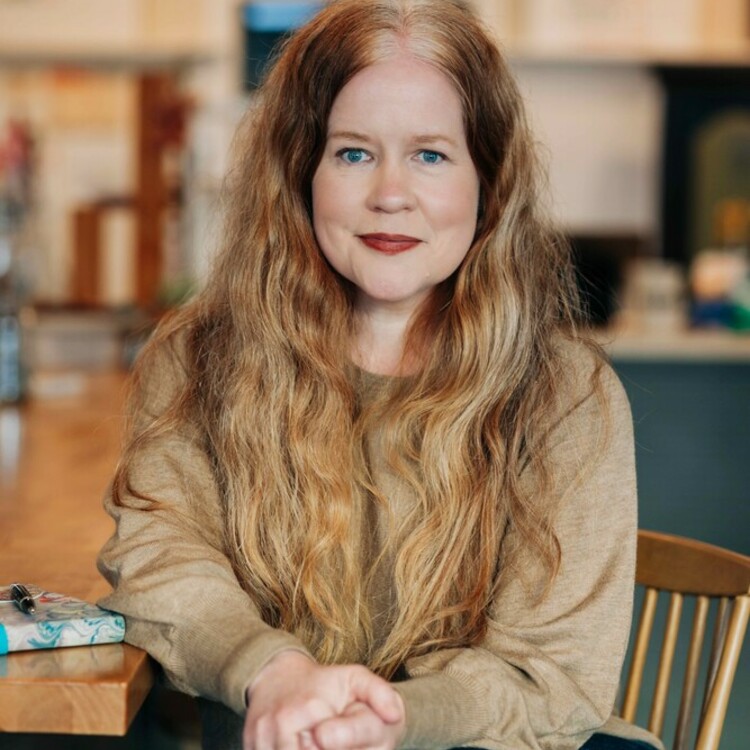
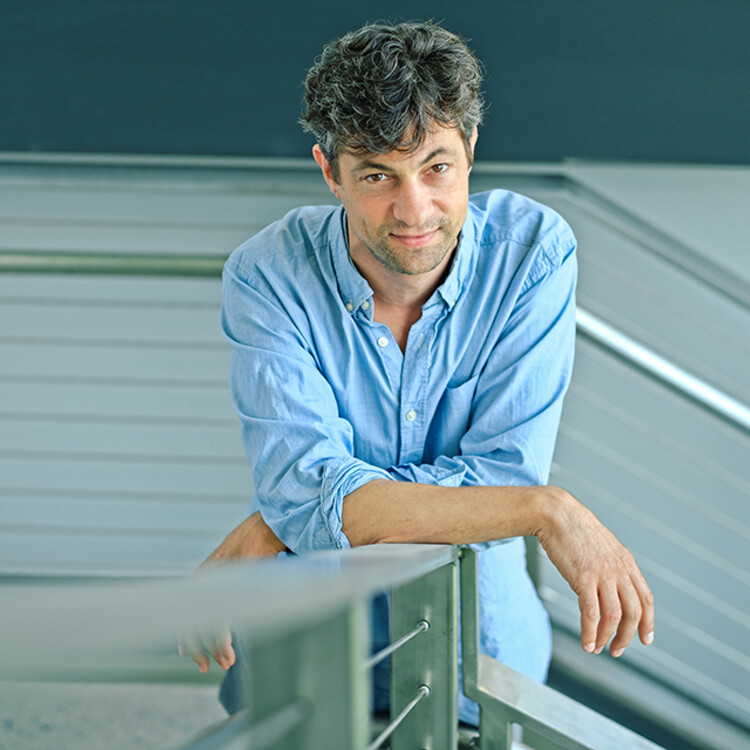
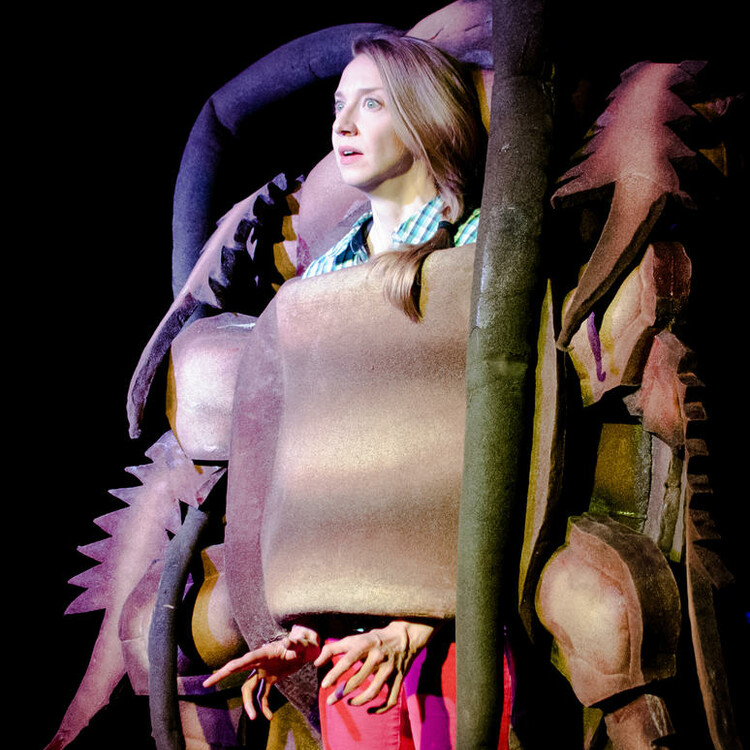
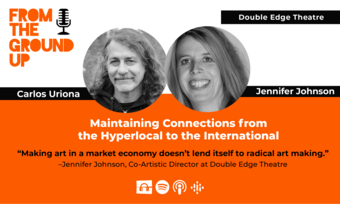



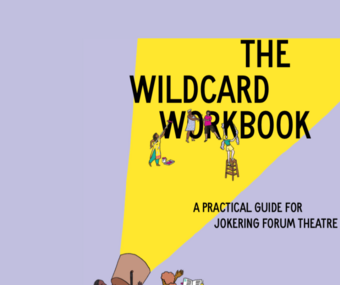










Comments
The article is just the start of the conversation—we want to know what you think about this subject, too! HowlRound is a space for knowledge-sharing, and we welcome spirited, thoughtful, and on-topic dialogue. Find our full comments policy here